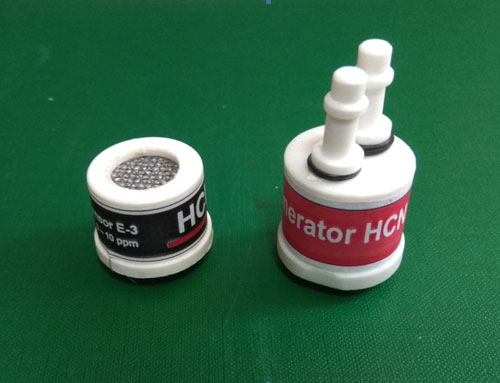The complex of devices for monitoring and diagnostics of gas analytical systems for the determination of cyanide conduit.
The potential range of electrochemical stability of titanium and catalytically active electrodes based on it in solutions of sulfuric and perchloric acid is determined. It was established that the production of hydrogen cyanide in the process of anodic oxidation of thiocyanate with a current efficiency of HCN of about 100% is possible using a 1 M KSCN solution.
The design of an electrochemical generator for the preparation of hydrogen cyanide air mixture was proposed, and platinum or titanium activated with Pt or RuO 2 was used as the working electrode. The range of the current load on the generators, in which the coulometric nature of the generation of hydrogen cyanide is preserved, is determined.
The kinetics of the electrochemical reduction of AgCN is investigated and its suitability for use as the cathode material of a HCN generator is shown. Prototypes of two-electrode cells of a compact HCN-generator were made. It has been established that the generator cells are capable to generate of HCN with a current efficiency close to 100%, at current loads of 1...10 mA. A laboratory sample of anelectrochemical generator of hydrogen cyanide was created, which, according to the range of concentration of hydrogen cyanide and the permissible error of its reproduction, meets the requirements for reference vapor-gas mixtures.
A three-electrode amperometric hydrogen cyanide sensor has been developed for monitoring the air environment based on gas diffusion highly dispersed catalytic electrodes using sulfuric acid solutions with the addition of copper (II) ions as an electrolyte and equipped with a chemisorption filter. Laboratory tests of the developed electrochemical sensors have been carried out, their technical
characteristics have been determined. Sensors developed by the range of measured concentrations, resolution, speed, and stability of the characteristics correspond to the best samples of the leading gas-analytical companies, and surpass them in selectivity.

| Attachment | Size |
|---|---|
| 123.58 KB |




